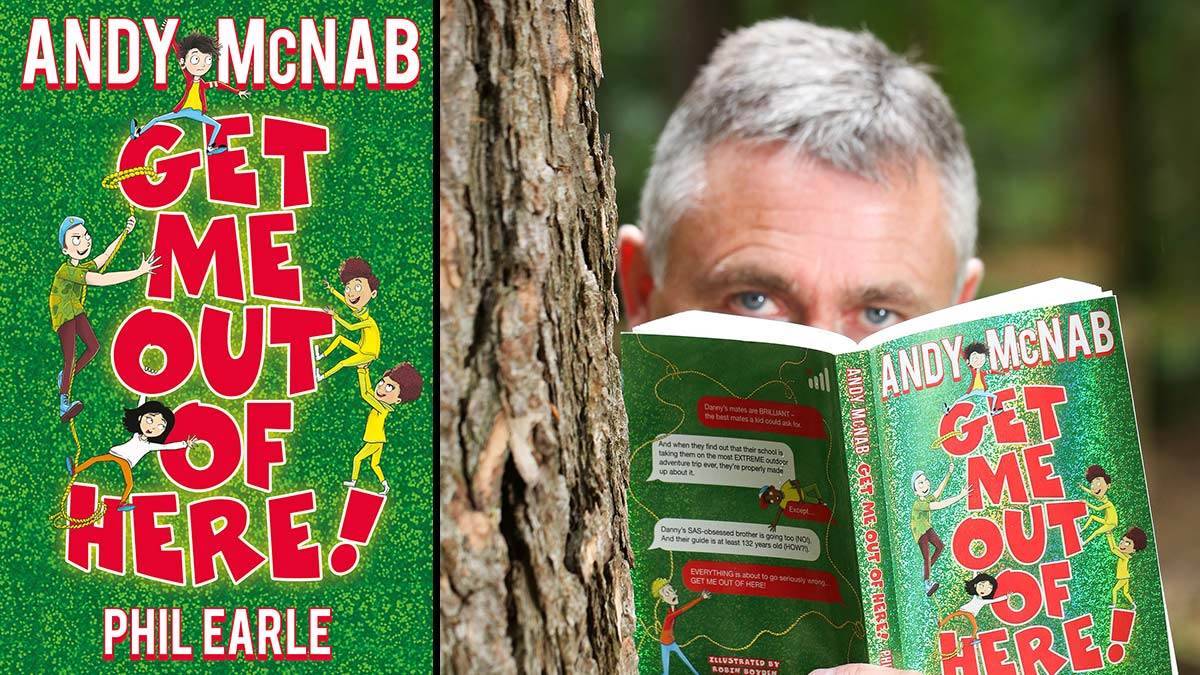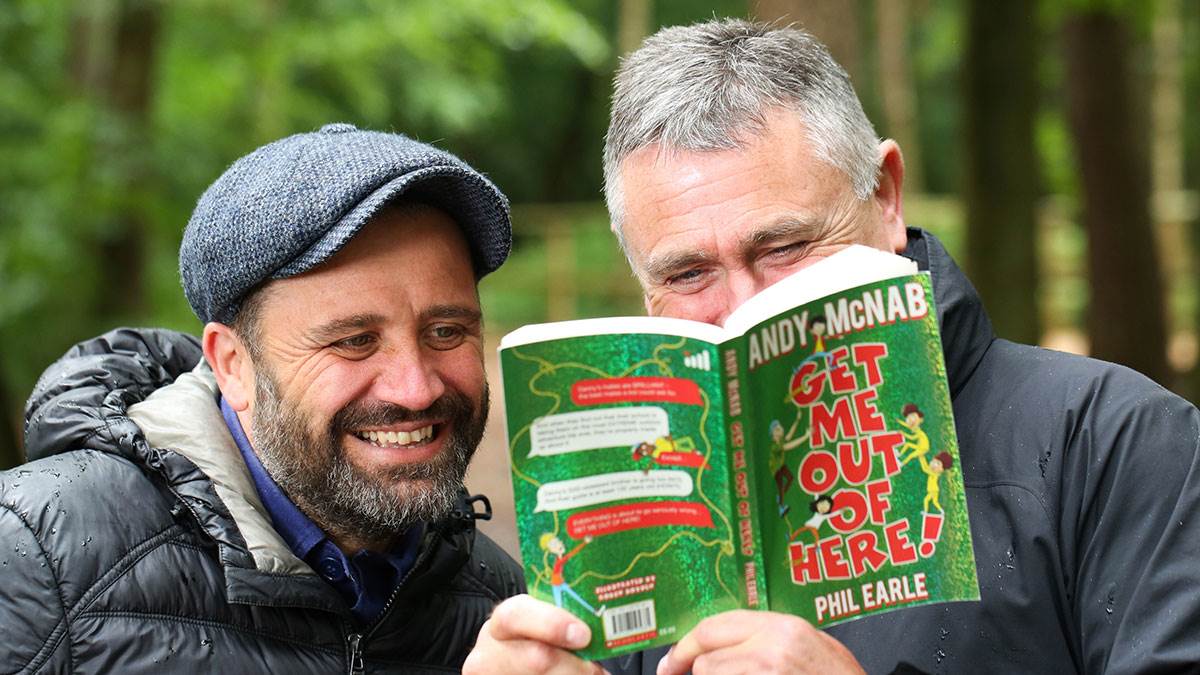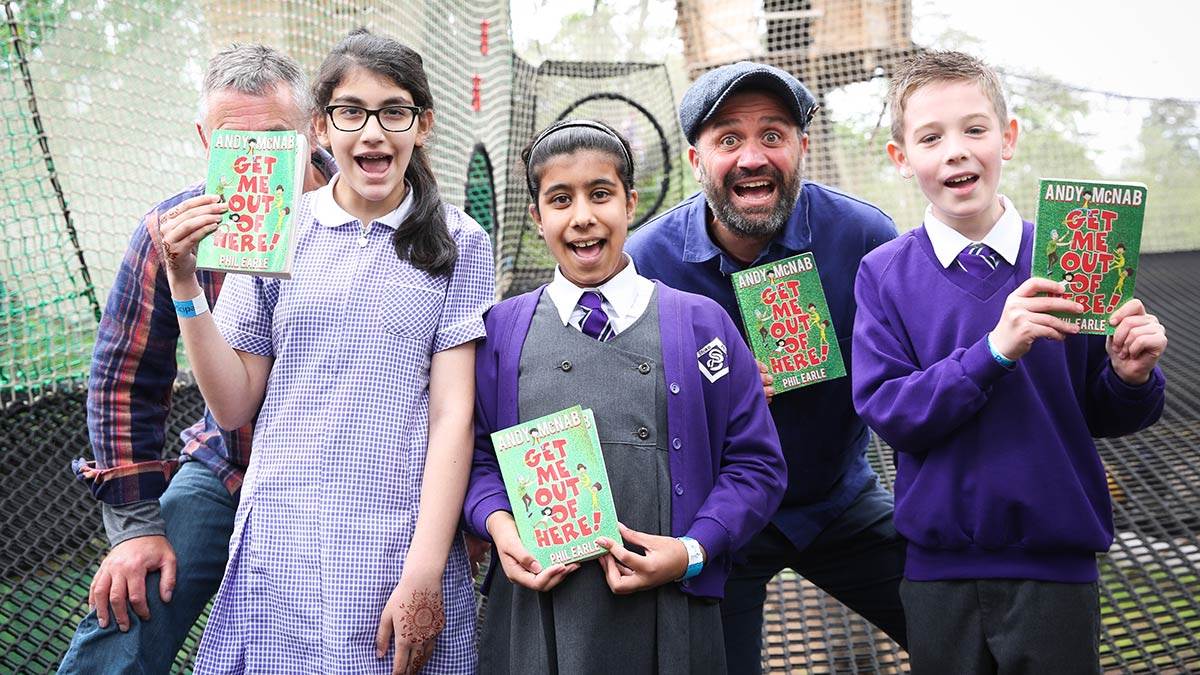Andy McNab: 'Reading absolutely changed my life - so now I'm writing for children'
Published on: 27 August 2019 Author: Andy McNab
Former SAS soldier Andy McNab has joined forces with Phil Earle to write a new children's book about a school trip like no other.
Here, he explains how reading changed his life - and why he's so keen for every young person to have access to books.

I guess I didn't have the most conventional start in life. I was abandoned as a newborn baby and found on the steps of a London hospital in a Harrods carrier bag. I was fostered and ended up being adopted by my foster family.
Growing up on a South London council estate, there wasn't much forward-thinking done by me or any of the other kids I grew up with. Along with education, what we were going to do with our lives didn't feature high on our agenda.
Most parents worked part time locally, wherever they could find the work, if they could find work. My mother had a job as a cleaner, and then worked in a Laundromat until her boat came in and she got a full-time job at the local chocolate factory. Most of the men worked on the docks, but the 'job for life' deal they had been promised was coming to an end. If your parents were really lucky, they had a job with London transport, or even better, at one of the printers in Fleet Street.
So the highest hopes I ever had as a kid were wanting to become a bus driver or a printer, although the latter was never going to happen because I had no relatives working in print, and to get a job there you needed to know someone in the 'Chapter'. You didn't need much education for any of those jobs, so that was it - why bother going to school?
I didn't realise reading was something you could enjoy. All I needed was to get a council flat, with or without a job. I had that cracked because my parents were already on the list. All I needed beyond that was a Mark Two Ford Escort and that was me made.
Feeling at the bottom of the pile
Like lots of kids on the estate, as a teenager I felt angry with people who had shiny new cars or spotless motorbikes, simply because they had stuff and I didn't. So I would vandalise people's shops, and mess up their goods, simply because they had it and I didn't.
I went to nine different schools between the ages of 5 and 15, so I had a lot of teachers to be angry with too. I was annoyed that they kept putting me in remedial classes, but I didn't exactly do anything productive to get out of them.
In fact, in the end, I used to like being at the bottom of the pile. It gave me yet another reason to feel angry. I liked feeling I was in the minority and that everyone was against me. I was part of a select club. I now felt my anger was justified, so I was entitled to do things that others couldn't or shouldn't do. After all, when you have nothing to lose, you can do whatever you like.
The only problem was that not everyone else saw things the same way, because by the age of 16, I ended up in juvenile detention. I was sent there for destroying a flat full of nice shiny things that someone else had worked hard for. I just didn't get that people had to work to get the things that I smashed up or stole, and to get work, you needed to be educated. I just wanted everything without understanding how to get it.

How joining the army gave me an education
The army used to recruit soldiers from detention centres. I fell for the recruiting team's patter that I was going to become a helicopter pilot, but I soon found myself in an Infantry Junior Leaders Battalion and committed to six years of service.
After three months of being shouted at and chased over assault courses - all the stuff that infantry soldiers do - we were marched off to the Army Education Centre. I didn't even know the army had educators. After all, I was in the army now, that was me done: why did I need to learn?
But that was when my world changed for the better.
I found myself in a classroom, alongside about 20 other boy soldiers, with an old sweat of a captain standing up front. He pointed out of the window towards the barbed wire fence and the real world beyond.
'Out there, they think you're all thick. But you're not. The only reason you can't read or write is because you do not read or write. But from today that all changes.'
And it did. I soon learnt that the reason I wasn't able to be a helicopter pilot was because I had the literacy and numeracy levels of an 11-year-old. I couldn't even read the tabloids properly.
As a 16-year-old, I read my very first book: Janet and John Book 10. It might have been written for children, but that didn't matter to me. I felt a true sense of pride. I was on my way to getting an education, and even more importantly, understanding why I needed one.
Spreading the love of reading

The idea of becoming a bestselling author is something that the teenage me would have laughed at. I didn't even know that it was a job back then. Not having read books as a child, I certainly hadn't ever thought about who wrote them!
When I finished writing my first book Bravo Two Zero, the feelings of pride and achievement that I'd felt as a teenager having read that first Janet and John story came flooding back. It had taken a while, and I'd had to learn a huge amount about the craft before coming up with something that was half decent, but I'd done it, and I knew that I would be able to do it again.
And it really has changed my life - I have no idea where I'd be now if I hadn't taken up writing.
I'd probably still be working for a private military company in a jungle somewhere. Sitting at a desk writing what I want to write or talking to people about books and writing is a lot more fun, believe me!
I spend a lot of my time explaining to people the importance of education and specifically reading. It absolutely changed my life and I've seen and heard time and time again how it has the same impact on other people.
There's a statistic that if boys stop reading as young teenagers, then they never really pick it up again. That's why I wanted to write young adult books and now books for younger children. The more we can give them to read, the more we can keep them reading.
My favourite books
I didn't read as a child, so when I started, I had a lot to catch up on! My all-time best books include:
1. To Kill a Mockingbird
As with so many classics, I am reading this for the first time, when I should have found it so much earlier. I haven't read Go Set A Watchman yet, although I'd like to. But this book really lifts the lid on 1930s American hypocrisy and racism. It is sadly as relevant today as it ever has been. I was in America at the time of the Louisiana racial shooting. Racism is rife in certain states, to the extent that there is a generation of young black men incarcerated for crimes the authorities know they didn't commit.
2. Animal Farm
I have just read this and can now see what all the fuss is about. The story may be a warning against communism but it is more about how people can change once they get a little power. The book is still just as relevant today as it has always been.
3. Great Expectations
The thing I love about Dickens is that if you replaced the horse and carts with cars and the coal fires with central heating, his books could have been written yesterday. That's because they are about people, and not so much about the time in which they were written. This book, I think, is his best.
Topics: Classics, School, Reading for pleasure, Features






Add a comment